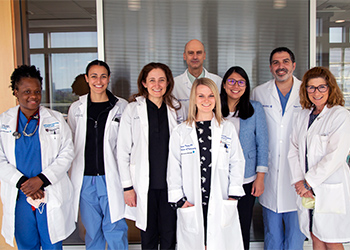A Leader in Brain Tumor Treatment
 The Brain Tumor Center at BIDMC offers you diagnosis and leading-edge treatment options with a multidisciplinary approach that includes medical, surgical and radiation oncologists, pathologists, nurse practitioners, nurses, social workers, and a palliative care team.
The Brain Tumor Center at BIDMC offers you diagnosis and leading-edge treatment options with a multidisciplinary approach that includes medical, surgical and radiation oncologists, pathologists, nurse practitioners, nurses, social workers, and a palliative care team.
Our core staff includes physicians with expertise in:
Neurosurgical Oncology
The Brain Tumor Center’s surgical team treats patients with both benign and malignant tumors of the brain and spine, with sub-specialization in skull base surgery, transsphenoidal surgery, and advanced stereotactic surgery.
Our surgeons utilize state-of-the-art equipment including:
- Functional MRI for preoperative planning to identify eloquent areas of the brain that should be preserved during surgery
- A variety of intraoperative microscopes to allow enhanced visualization
- Frameless and frame-based stereotactic guidance for intraoperative tumor localization
- Awake craniotomies for preservation of speech and motor function
- Intraoperative cortical brain mapping and stimulation to prevent damage to normal tissue
- Fluorescence-guided surgery (5-ALA) allowing illumination of the tumor in relation to healthy tissue
- Surgical endoscope for intraventricular and pituitary tumors
- Ultrasound guided technique to increase the extent of tumor resection
- Cavitron ultrasonic aspirator for tumor resection
Neuro-Oncology
In recent years, many novel and effective therapies have been developed for treating brain cancer. Our patients benefit from the newest and best treatment options and resources available.
Depending on the type of brain tumor and the treatment plan designed, you may receive treatment with chemotherapy and/or biologic agents. These treatments may be administered in a number of ways, including:
In addition to conventional treatments, the center also offers innovative, investigational brain tumor treatment such as:
- Clinical trials
- Small molecule therapies
- Immunotherapy
- Intra-tumoral treatments
- Next generation chemotherapeutic agents
Radiation Oncology
The BIDMC Radiation Oncology Department offers a wide range of advanced treatment techniques in radiation therapy. Depending on the type of brain tumor and the overall care plan, one or more of the following treatments may be recommended:
- Stereotactic radiation treatment is non-invasive and offers precise targeting accuracy, with minimal exposure to surrounding critical healthy tissue. It is especially effective at treating hard-to-reach tumors and its high radiation dose allows for a shorter course of treatment compared to traditional radiation therapy. There is often a limit to the size of tumors that can be treated or the total number of tumors. At Beth Israel Deaconess Medical Center, we use a machine called CyberKnife to deliver stereotactic radiation.
- Volumetric Modulated Arc Therapy (VMAT) is a type of fractionated radiation therapy that is especially effective at treating diffuse, larger tumors in critical locations, such as behind the eye. VMAT is usually delivered in small doses over a long course to minimize short- and long-term neurological side effects.
- Whole brain radiation is another type of fractionated therapy that allows for treatment of the entire brain. This is useful where there are multiple tumors in the brain as it can treat all the tumors at once, including tumors that may be too small to see on an MRI scan. This therapy is typically used to treat metastatic disease (that is, cancer that has spread from another organ or site to the brain), and to reduce the risk of tumor recurrence following surgery and in areas remote from the surgical site.
Neuropathology
Neuropathology is the study of diseases of the nervous system which includes the brain and the spinal cord. Our neuropathologists analyze tumor tissue to determine the type and stage of the disease, and guide therapy.
Neuroradiology
Neuroradiologists are medical doctors who specialize in the diagnosis and characterization of abnormalities of the central and peripheral nervous system (brain, spine, head and neck). They utilize imaging techniques such as magnetic resonance imaging (MRI) and computed tomography (CT) to diagnose and treat disease, and consult with the patient’s primary medical team to review images and recommend further testing.
Extensive Expertise
Physicians are board certified in their areas of expertise, with appointments at Harvard Medical School—all indicators for the best quality outcomes. Our registered nurses and nurse practitioners have extensive neuro-oncology expertise.
Collaborations
In our multidisciplinary brain tumor conference and clinics, our team collaborates to discuss your particular tumor and the best treatment options for you. In our clinic you will see all your necessary specialists in one location, for convenience and ease.
Together we will help you learn about:
- Your diagnosis, the tests you will have, and any necessary preparations
- The procedure or operation you will need
- Your recovery period, medications, returning home and much more
We can help you and your family manage your care, arrange appointments, and coordinate any additional resources you might need such as support groups that are available in the Boston area.
 The Brain Tumor Center at BIDMC offers you diagnosis and leading-edge treatment options with a multidisciplinary approach that includes medical, surgical and radiation oncologists, pathologists, nurse practitioners, nurses, social workers, and a palliative care team.
The Brain Tumor Center at BIDMC offers you diagnosis and leading-edge treatment options with a multidisciplinary approach that includes medical, surgical and radiation oncologists, pathologists, nurse practitioners, nurses, social workers, and a palliative care team.